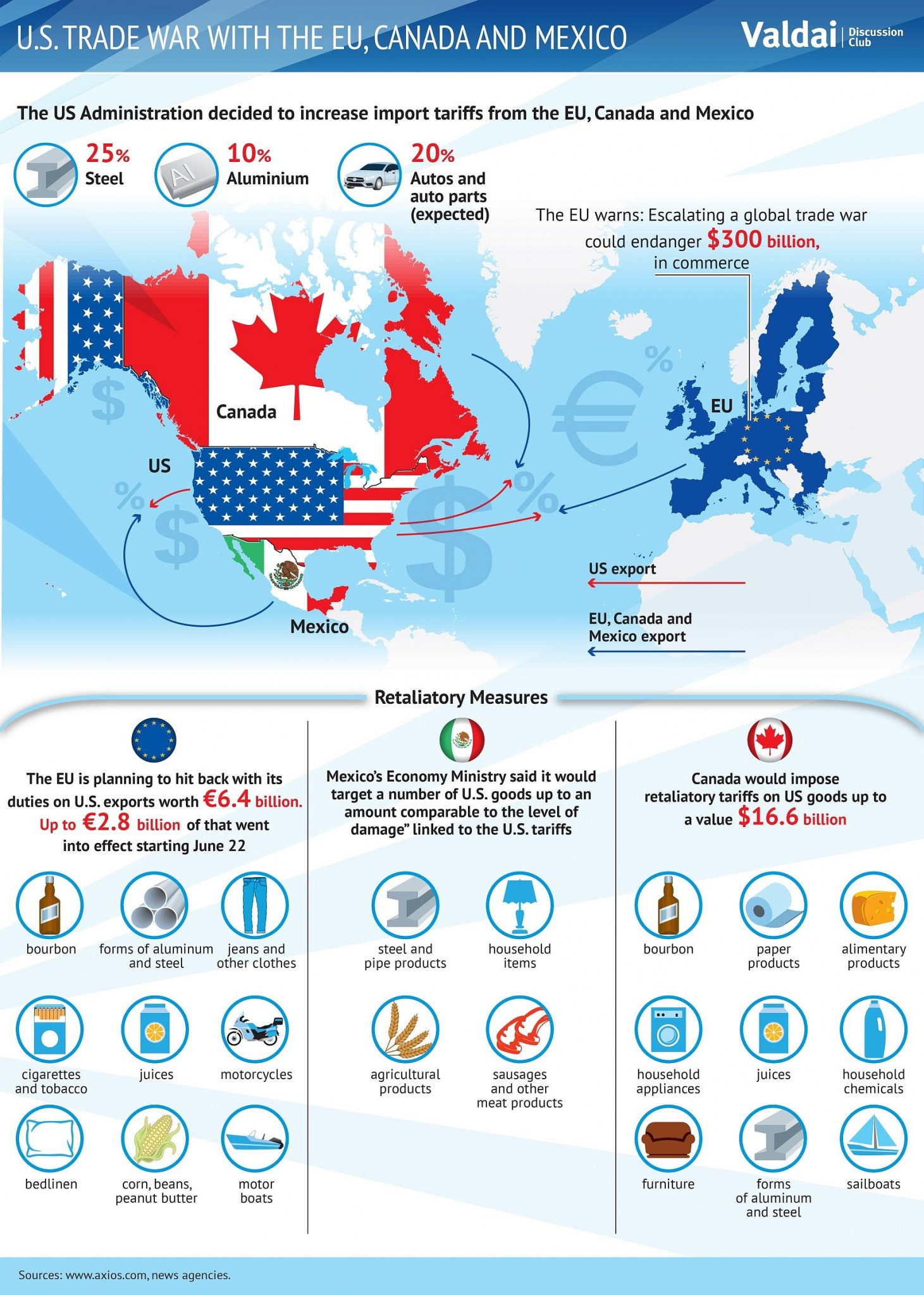The trade war is looming between the United States and the European Union. The attacks of the President of the United States, Mr. Donald Trump, against Germany were a clear surprise. However, they are quite understandable, in a context marked by the heavy trade deficit of the United States in comparison to to Germany. Moreover, this issue does have a political dimension too. In fact, is the European Union still mean something in terms of Donald Trump's policy? And above all, is the time of the great free trade agreements definitely over?
The trade dispute between the United States and the European Union is no surprise. The European Union has a massively positive trade balance. However, this situation covers a certain ambiguity. When we amalgamate the countries of the European Union, it's a bit like adding apples to carrots. In fact, what lies behind these global statistics is the weight, but also the strategy, of Germany. The latter wants to move forward behind the European Union, because it does not want to assume its responsibilities, be it in the EU or at the international level. However, the currency of this country, thanks to the Euro, is actually undervalued by 15% at best and probably by 27% at worst [1]. Indeed, if Germany had kept the Deutschemark, the exchange rate with the US Dollar would be at least 1.35 USD (and at the maximum of 1.50 USD) while it is only 1.17 USD with the Euro. This undervaluation of the German currency against the dollar plays of course an important role in the evolution of the US trade balance and its deficit compared to Germany. From this point of view, Donald Trump is right in considering that Germany is in a position of unfair competition vis-à-vis the United States.
But behind this real and obvious problem of undervaluing the German currency there is a political problem. Deciding to engage the fight against the European Union in general, and against Germany in particular, Donald Trump upsets the balance that was formed since the early 2000s. Very clearly, the now EU has become marginal in comparison with China. Donald Trump understood this, and he brutally meant it to the Europeans.
During the talks that will take place on July 25 in Washington between the President of the European Commission, Mr. Jean-Claude Juncker and Donald Trump, the indirect question will be whether the European Union and the United States can still have a dialogue. This could be difficult. As a matter of fact the EU is weakened by the German policy that seeks to make the most of the European institutions without paying the price. If useful discussions are to take place, they should bring together Angela Merkel and Donald Trump. Because it is properly the mercantilist policy which is led by Germany, and its cost for the United States.
 Before the Economic and Monetary Union was in place, before the Euro, this conflict had already happened. Remember the many meetings that took place from 1973 to 1990, some of which had resulted in significant changes in exchange rates. But this can’t happen anymore, at least as long as the Euro survives. We see here what it costs the European Union to have engaged in this fatal adventure of the single currency.
Before the Economic and Monetary Union was in place, before the Euro, this conflict had already happened. Remember the many meetings that took place from 1973 to 1990, some of which had resulted in significant changes in exchange rates. But this can’t happen anymore, at least as long as the Euro survives. We see here what it costs the European Union to have engaged in this fatal adventure of the single currency.
Since some exchange rates movements can no longer settle the question, at least for the moment, it will be settled at the level of customs duties. And here we can see that we can’t have free trade and systems that prevent the fluctuation of exchange rates for the currency of each country at the same time. But this will shatter even more the global free trade framework. However, this framework had been set up largely at the instigation of the United States.
The challenge of free trade is now a reality, whether in the United States, and Donald Trump gives the example, but also within the European Union. Italy, through the government of Giuseppe Conte, has made it clear that it will refuse to ratify CETA, the treaty between the European Union and Canada. In doing so, it is also burying the recently signed agreement between the European Union and Japan. It must be noted. The time of the great free trade agreements is over. The discussions of July 25 will have to draw all the consequences.
[1] See the IMF studies, http://www.imf.org/en/Publications/Policy-Papers/Issues/2017/07/27/2017-external-sector-report and http://www.imf.org/en/Publications/Policy-Papers/Issues/2016/12/31/2016-External-Sector-Report-PP5057




